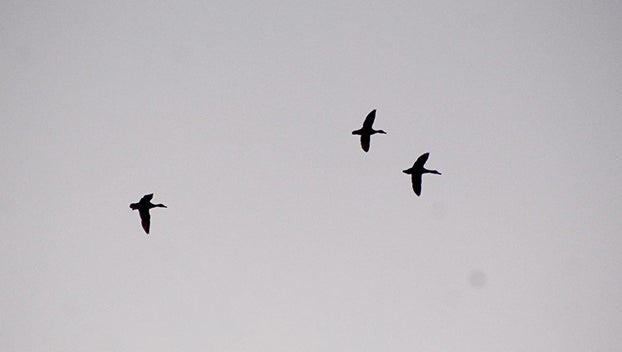MSU receives funding for duck tracking project
Published 8:23 am Wednesday, October 30, 2024

- Three ducks fly over St. Catherine Creek National Wildlife Refuge south of Natchez. (File Photo | Hunter Cloud)
JACKSON — Mississippi State University received $30,000 from the Mississippi Department of Wildlife, Fisheries and Parks paired with an anonymous donation to fund a duck tracking research project. The allocated funding was awarded for the first year of the project and could be recommended on a yearly basis.
James Callicutt, with MSU, gave a presentation on the project at a MDWFP commission meeting last week.
He said the project will study fine scale habitat selection through GPS transmitters affixed to early arriving mallards. Callicutt said they really wanted to study mallards who arrive this time of year.
“We hope to glean a lot of important information to give us a snapshot of how they are using the landscape to inform wetland management, how we can better manage WMAs and moist soil units,” Callicutt said. “We have strong roots with MDWFP and we have a good idea of what the agency is looking for. As an extension faculty member, I hope the research will translate to have strong management implications.”
Mississippi State University commonly serves as the unofficial research arm for the Mississippi Department of Wildlife, Fisheries and Parks. Callicutt said technology has advanced and they hope to get more information they might not have been able to get before.
The new satellite transmitters will allow MSU to take GPS coordinates every 20 minutes. Mallard hens will make up the majority of the birds outfitted with the GPS transmitters as they are less susceptible to hunter harvest and predation.
Callicutt added they hoped to gather reproductive information from the mallard hens as well. Battery life on the transmitters will be for several years. Callicutt said they will hope to have 50 ducks outfitted with transmitters for the project each year.
“We have a laundry list of questions regarding fine scale habitat selection. We will analyze habitat use, quantify effects of wetland structure, food availability, vegetation cover and density with focus on forested wetlands,” Callicutt said. “We will monitor post hunting season movements, habitat use, initiation dates of spring migration and the location of breeding.”
The hope is the research will allow MSU to answer a lot of other questions down the road.
Callicutt said additionally they are working to learn more about waterfowl, moist soil habitat management and the effects of disking and herbicide applications in wetlands.





